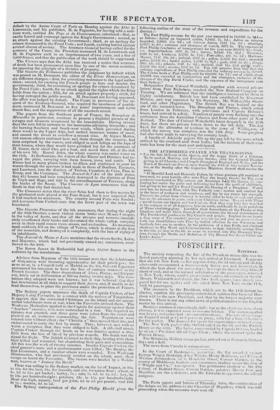The Sydney papers announce the death of Captain Croker, of
her Majesty's ship Favourite, in a contest with the natives of Tongataboo. It appears that the converted Christians on the island and the uncon- verted inhabitants were at war, when the Favourite arrived there. The Wesleyan Methodists applied to the Captain for assistance against their " heathen ". enemies, who were intrenched in a fort. The required as- sistance was granted, and three guns were taken from the vessel and planted on an eminence commanding the fort. Negotiations were entered into without effect the " Christiass" then opened their fire, and endeavoured to carry the fort by storm. They, however, met with so warm a reception that they were obliged to halt. A rifle-hall struck Captain Croker through the heart, as he was leaning against a tree, faint front the loss of blood by previous wounds. Ins death was the signal for flight. The British returned to their ship, bearing with them their killed and wounded, but abandoning their guns and ammunition. All this was the work of twenty minutes. Besides Captain Croker, the chief gunner's-mate and a quartermaster were killed ; Mr. Dunlop, the first Lieutenant, and a number others were wounded. Two Wesleyan Missionaries, who had previously resided on the island, made their escape on board the Favourite. The victors were headed by a Welch- man, known as " Jennny the Devil."
Flour was selling in the Sydney market, on the 1st of August, at 368. to 41s. for the best, 31s. for seconds, and 288. for ration flour ; wheat, at 98. 6d. to 118. per bushel ; barley, 7s.; oats, is. 6d. to 8s. 6d. : hay, 9s. to 10s, per hundredweight ; potatoes, 128. to 158. per hundredweight. Meat was high, namely, heel per joint, 4d. to 5d. per pound; veal 10d. to Is.; mutton, 4d. to 5d.
The Sydney correspondent of the Port Phillip Herald gives the
following outline of the state of the revenue and expenditure for the district- The Port Phillip revenue for the past year amounted to 14,000/. 58. as follows : duties on imported spirits, 8,9451. is. Id.; duties on tobacco imported, 2,966/. 11g. 9d.; ad valorem duties, 751/. 14s. 6d.; wharfage, 1,037/. 4s. 6d.; entrance and clearance of vessels, 307/. 8s. The expenses of Port Phillip (exclusive of immigration) for the year were 20,087/. ltis. It viz. Superintendent, 531/. 2s. 3d.; survey, 2,644/. 13s. 2.1d. ; Treasurer, 889/. Is. 5d.: Customs, 3,176/. 35. 114.; Post-office, 48/. 5s. 5d.; Harbour- Master, 714/. 13s. 2d.; judicial, 935/. 4s.; police, 2,413/. 16s. 6111.: mounted police, 2,554/. 9a.; border police, 1,8081. 9s. 9W.; gaols, 539/. 3s. 2d. ; clergy, 3991. 15s. Id.; schools, 302/. l. 5d.; medical, 322/. 11g. 2id. public works, 2,592/. 19s. 11d.; arrears, 193/. 8N. 7d. You will perceive front this that the ordinary expenditure of Port Phillip exceeded the ordinary revenue by 6,000/. The Crown lands at Port Phillip sold for 60,639/. 14s. 71; out of which about 10,000/. was expended on immigration and the aborigines, exclusive of the charges of the ship David Clarke, and the expenses of the immigrants scut from Sydney."
Despatches from Colonel Wakefield, together with several private letters from Port Nicholson, reached the New Zealand Company on Tuesday. We are informed that the intelligence conveyed by them is highly satisfactory. British law had been established by Governor Hobson, and was executed by his Secretary, Mr. Willoughby Short- hand, and other Magistrates. The British flag was hoisted on the site of the intended town. The Brougham and Platina, which sailed from London in February, with provisions and Captain Hobson's house, had arrived in safety. Numbers of people were flocking into the settlement front the Australian Colonies and from other parts of New Zealand. The date of Colonel Wakefield's latest despatch is the 27th June, but there are private letters down to the 9th July. The day fixed for the allotment of sections in the town of Wellington, of which the survey was complete, was the 13th July. Same progress had also been made in surveying the country lands.
A bundle of Adelaide papers fills up the gap left by the news which arrived by the overland mail from India; but the interest of their con- tents has been for the most part anticipated.


























 Previous page
Previous page